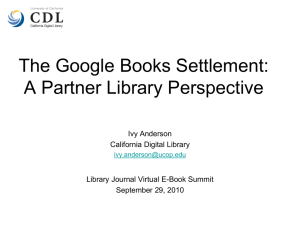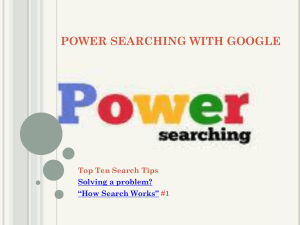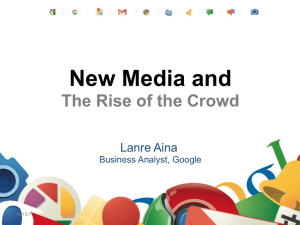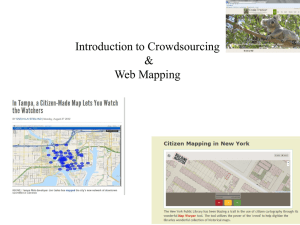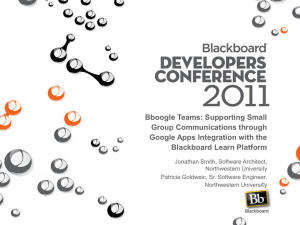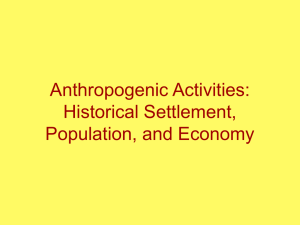Google book search settlement_Kylie Pappalardo
advertisement
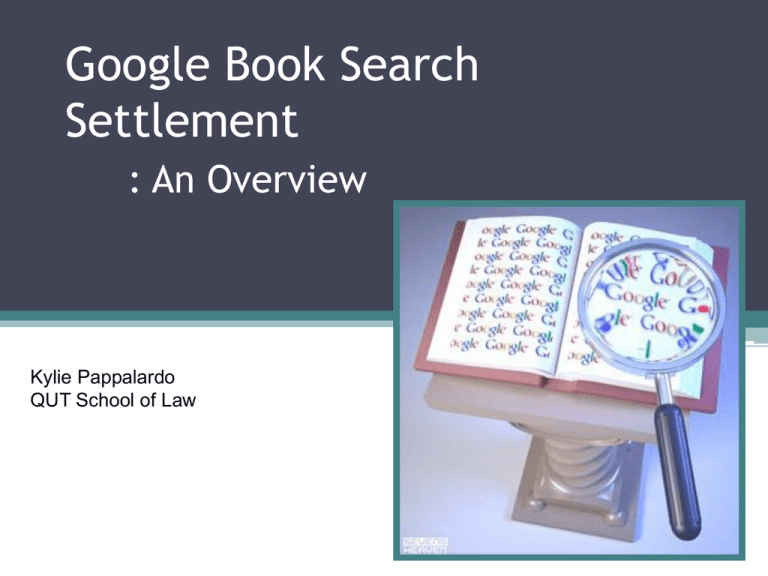
Google Book Search Settlement : An Overview Kylie Pappalardo QUT School of Law What is the Google Book Search Project? • In 2004, Google launched the Google Print Project, which was subsequently renamed the Google Book Search Project in November 2005 • Google’s intention was to digitize the world’s collection of books • Google planned to scan as many books as possible and make these scans available (in a limited fashion) to users online • Potentially revolutionary for research http://books.google.com/ A “library of Alexandria for the digital age”? “A Rainbow of Books”, Dawn Endico, licensed under Creative Commons Attribution Share Alike 2.0 Generic licence, http://www.flickr.com/phot os/candiedwomanire/1651 870/ Taking a step back: Access to literature • The open access (OA) movement aims to promote the dissemination of knowledge broadly and freely across the internet in a timely fashion • Usually, we are talking about academic articles / papers • Largely came about as a result of the “serials crisis” Why Open Access? • Researchers should not have to pay to access and use content that they provided, reviewed and edited for free • Enables greater use of a work, both by the author and by others • Helps authors to control their work, by allowing them to decide what uses of the work can be made by free • Knowledge is a public good • Where research is publicly-funded, the public should not have to pay AGAIN to access research results Why Open Access? • When researchers cannot access relevant research literature, it slows research development • There are ethical arguments to support OA for those who cannot afford to pay and to distribute the public good of knowledge equitably amongst all who can make use of it • OA provides greater visibility to a researcher’s work, resulting in more citations and greater research impact How is OA achieved? • Most commonly, by deposit in an OA repository • These are usually institutionally (university) based • Academics/researchers can deposit (‘self-archive’) their articles into the repository • Makes the work openly accessible to the public – searchable via Google • Some articles available to read only; others available for reuse under copyright licences - what uses are allowed depends on copyright arrangements between author and publisher OA repositories • QUT has an ePrints repository: http://eprints.qut.edu.au/ How does this translate to books? • Some of the arguments are the same – knowledge as a public good; equitable access to information • Particularly for academic/research works [not novels] • We see these arguments made later, by academics such as Pam Samuelson • Google Book Search Project as one giant OA repository? Google Book Search Project Two limbs: Google Publisher • Opt-in for publishers – Google scans books as provided by the publisher • Publisher specifies level of access and use permitted for the public re: scanned book Google Library • Google scans books in partner libraries, with consent of the libraries but not necessarily publishers • Opt-out for publishers Google Library – original access regime 3 categories of the 18 million books scanned: In © in print 9% of total Access determined by © owner In © out of print 75% of total Snippet access Public Domain 16% of total Full access for free Source: http://www.lessig.org/blog/2006/01/google_book_search_the_argumen.html Snippet access: example Pride and Prejudice, Jane Austen, Spark Educational Publishing, 2004 http://books.google.com/books?id=vjy7O6kCH0wC&dq=subject:%22+Literature+%22&as_brr=3&rview=1&so urce=gbs_navlinks_s Search term: truth The lawsuit • In 2005, the Authors Guild (AG) and the Association of American Publishers (AAP) sued Google for “massive copyright infringement” • This was a class action suit – representing all authors with an interest affected by the Google Book Search Project • A number of US copyright scholars felt that Google would have won the suit on fair use grounds • But this was never determined, because the AG/AAP and Google negotiated a settlement The lawsuit: AAP and AG’s arguments • Google had “reduced the value of those works to the rights holders, caused lost profits, and damaged the goodwill and reputation of those rights holders”. • Google’s use was NOT fair use because: Google’s use was commercial (profit from advertising) Systematic users could patch together significant portions of a book from snippets provided by Google Google’s opt-out policy reversed the usual burden of notification The lawsuit: AAP and AG’s arguments • Even if the snippets were fair use, Google had to copy entire works to make snippets available, which was not fair use • Relied on UMG Recordings, Inc. v. MP3.com Inc 92 FSupp 2d 349 (SDNY 2000) The lawsuit: Google’s arguments • The Book Search Project WAS fair use because: Indexing would help sell books, generating revenue for rights holders It does not violate the law to sell advertisements next to fair use snippets The argument that snippets could be patched together does not preclude fair use – it is true of every kind of fair use Opt-out is the standard for indexing web-content and the entire project would be virtually impossible otherwise The lawsuit: Google’s arguments • The project is fair use because it does not offer a substitution for the original work, but rather an advanced index that refers back to the original work in a way that provides value to that work • Relied on Kelly v Arriba Soft 336 F.3d 811 (Cal. 2003) A perspective on the lawsuit “[Google is] bent on unilaterally changing copyright law to their benefit and in turn denying publishers and authors the rights granted to them by the U.S. Constitution…[The lawsuits against Google are] needed to halt the theft of intellectual property. To see it in any other way is intellectually dishonest.” Pat Schroeder and Bob Barr, ‘Reining in Google,’ Washington Times (Washington), 3 November 2005 http://www.washingtontimes.com/news/2005/nov/02/20051102093349-7482r/ at 8 April 2010 A perspective on the lawsuit “As both an author and publisher, I find the [Authors] Guild's position to be exactly backward…A search engine for books will be revolutionary in its benefits. Obscurity is a far greater threat to authors than copyright infringement, or even outright piracy…Google Library is intended to help readers discover copyrighted works, not to give copies away. It's a tremendous service to authors that will help them beat the dismal odds of publishing as usual.” Tim O’Reilly, ‘Search and Rescue’, New York Times (New York), 28 September 2005 <http://www.nytimes.com/2005/09/28/opinion/28oreilly.html> at 9 July 2009. Lawrence Lessig on the lawsuit • http://www.lessig.org/blog/2006/01/google_bo ok_search_the_argumen.html “2008_04_05_lessig-ames_08”, dsearls (Doc Searls), licensed under Creative Commons Attribution Share Alike 2.0 Generic licence, http://www.flickr.com/photos/docsearls /2389118085/ The original settlement timeline 28 October 2008: Google, AAP and AG reach a Settlement Agreement, subject to court approval The Settlement Agreement binds all persons who as at 5 January 2009 own a ‘U.S. copyright interest’ in one or more books affected by the settlement 17 November 2008: Judge John E. Sprizzo gave preliminary approval to the Settlement Agreement 4 September 2009: opt-out deadline for authors who do not want to be bound by the Settlement Agreement 7 October 2009: final fairness hearing Original Settlement Agreement: terms • Settlement affected: • books published before 5 January 2009 • Authors and publishers within the US, and outside the US if the book was published in the US or the author or publisher’s country has copyright relations with the US because it is a member of the Berne Convention • Google must pay minimum US $45 million to Class members, to be distributed as cash payments of US $60 per Principal Work, US $15 per Entire Insert and US $5 per Partial Insert Original Settlement Agreement: terms • Google must pay US $34.5 million to establish the Book Rights Registry, which will coordinate payments and represent interests of Rightsholders • Google may sell advertising on online book pages, Institutional Subscriptions to the book database and Consumer Purchases to individual users (which allow a user to view online the full contents of a book), but must pay 63% of all revenues earned to the Rightsholders Original Settlement Agreement: terms • Google is given the right to digitize and display (to different extents) all books. • Google will classify a book as a ‘Display Book’ if it is not commercially available at the notice commencement date and as a ‘No Display Book’ if it is commercially available. • Commercially available = the Rightsholder is offering the book for sale new through one or more then-customary channels of trade in the United States. Original Settlement Agreement: terms • No Display Books = cannot display expression from the book, only bibliographic information • For Display Books, can make Display Uses: • Snippet Display • Front Matter Display • Access Uses – Institutional Subscriptions, Consumer Purchase and Public Access Services • Preview Uses – a free preview to allow users to sample a book prior to making a purchase decision – Standard Preview is up to 20% of pages of a book (+ Front Matter Display) but no more than 5 adjacent pages at a time, before or after which at least 2 pages must be blocked [The standard can be changed at the request of the Rightsholder] Original Settlement Agreement: terms • Institutional Subscriptions – provided to institutions for a fee; allows access to entire database; users given some rights to copy/paste and print pages of books • Consumer Purchase – allows a user, for a fee, to access and view online the full contents of a Display Book; user given some rights to copy/paste and print • Public Access Services – provided to each public library and not-for-profit higher education institution; provides access to entire database for free on a limited number of computer terminals; users may print pages from Display Books for a per-page fee The settlement: public benefits • The entire books database may be used for ‘NonConsumptive Research’ (i.e. computational analysis) – useful for linguistics studies etc. • The Public Access Service • The Settlement Agreement grants greater access to the digitized books than would be allowed under fair use (i.e. more than just snippets) • The Google Book Search Project makes accessing out-ofprint works much easier • Greater access for persons with print disabilities Settlement issues: Fair Use • By settling this case, Google has removed from the public the possibility of a new (wider) fair use precedent. No one other than Google has the resources to fight this kind of battle out to the end. Thus, the opportunity for others to move into this space legally (without negotiation) has been removed – at least for the immediate future. A perspective on the “lost fair use precedent”: Lessig “2008_04_05_lessig-ames_08”, dsearls (Doc Searls), licensed under Creative Commons Attribution Share Alike 2.0 Generic licence, http://www.flickr.com/photos/doc searls/2389118085/ A perspective on the “lost fair use precedent” • One of the greatest ramifications of this settlement is that in will set in motion a way of thinking about gaining access to culture that moves us away from a library model and towards a model that requires us to buy access to our cultural works • A digital bookstore of Alexandria • This is the result of publishers pushing to extend their hold in the market – a publisher’s lifespan in the physical market in relation to a particular book is a year or two at most, but in the digital market, it is potentially the entire length of copyright protection Lawrence Lessig at the Copyright Future: Copyright Freedom conference in Canberra, 27-28 May 2009 A perspective on the “lost fair use precedent” “Google was the defendant; it earned that dubious privilege by actually scanning and searching books. Having stepped up to the plate to risk a lawsuit, and having been beaned with one, Google now has the right to choose whether to settle that suit. Google’s choice to settle takes away no legal rights from anyone else; no one else loses the fair use argument because Google didn’t chance it.” James Grimmelmann, “How To Fix The Google Book Search Settlement”, Journal of Internet Law, Volume 12, Number 10, April 2009, p12, available from SSRN at http://papers.ssrn.com/sol3/papers.cfm?abstract_id=1363843. Settlement issues: Public Access • Harvard University Librarian, Robert Darnton, has suggested that a single public access computer terminal per public library building is not enough • Pam Samuelson and other academics argued that the Settlement did not allow rights holders to direct that their book be available for free or under an open content licence such as Creative Commons (esp. relevant to academic books) A perspective on public access: Robert Darnton “Harvard University”, jrgcastro, licensed under Creative Commons Attribution Non Commercial Share Alike 2.0 Generic licence, http://www.flickr.com/photos/jrgc astro/3220824662/ A perspective on public access “Looking back over the course of digitization from the 1990s, we now can see that we missed a great opportunity. Action by Congress and the Library of Congress or a grand alliance of research libraries supported by a coalition of foundations could have done the job at a feasible cost and designed it in a manner that would have put the public interest first. By spreading the cost in various ways—a rental based on the amount of use of a database or a budget line in the National Endowment for the Humanities or the Library of Congress—we could have provided authors and publishers with a legitimate income, while maintaining an open access repository or one in which access was based on reasonable fees. We could have created a National Digital Library— the twenty-first-century equivalent of the Library of Alexandria. It is too late now. Not only have we failed to realize that possibility, but, even worse, we are allowing a question of public policy—the control of access to information—to be determined by private lawsuit.” Robert Darnton, “Google & the Future of Books”, The New York Review of Books, Volume 56, No. 2, 12 February 2009, http://www.nybooks.com/articles/22281. Perspectives on public access “So much for the promise of the digital age. This sounds more like the age of the CD-ROM.” Richard K. Johnson, “BackTalk: Free (or Fee) to All?” (2008) http://www.libraryjournal.com/article/CA6624784.html (Richard K. Johnson was the Founding Executive Director of SPARC (the Scholarly Publishing and Academic Resources Coalition) from 1998 to 2005) A perspective on public access: Pam Samuelson Perspectives on public access “We believe that most scholarly authors of out-of-print books would prefer to make their books widely available with either no or minimal restrictions. We are concerned that an Authors Guild or AAP-dominated Book Rights Registry (BRR) will have an institutional bias against helping academic authors who might want to put their books in the public domain or make them available under Creative Commons licenses.” Letter from Pamela to Judge Denny Chin, Authors Guild, Inc. v. Google Inc., No. 1:05 CV 8136, (S.D.N.Y. April 27, 2009), available at http://thepublicindex.org/docs/motions/approval/samuelson.pdf A perspective on public access: University of California Academic Council “Open Access”, AJC1, licensed under Creative Commons Attribution Non Commercial Share Alike 2.0 Generic licence, http://www.flickr.com/photos/ajc1/4051820019/ Perspectives on public access “Specifically, we are concerned that the Authors Guild negotiators likely prioritized maximizing profits over maximizing public access to knowledge, while academic authors would have reversed those priorities. We note that the scholarly books written by academic authors constitute a much more substantial part of the Book Search corpus than the Authors Guild member’s books…[UC] has made a major commitment in recent years to promote open access of research materials produced by its own and other researchers. Many UC faculty now routinely post their work in open access repositories, and UC has done much to promote the open access preferences of faculty members…However, the [settlement] agreement does not explicitly acknowledge that academic authors might want to make their books, particularly out-of-print books, freely available by dedicating their books to the public domain or making them available under a Creative Commons or other open access license…We are concerned that the BRR will have an institutional bias against facilitating these kinds of unfettered public interest, open access alternatives.” Letter from the Academic Council, Univ. of Cal., to Judge Denny Chin, Authors Guild, Inc. v. Google Inc., No. 1:05 CV 8136 (S.D.N.Y Aug. 14, 2009) http://thepublicindex.org/docs/letters/ucfaculty.pdf Response: Amended Settlement Agreement • 4.8 Public Access Service - amended (3): “in the case of each Public Library, [deleted - no more than] one terminal per Library Building; provided, however, that the Registry may authorize one or more additional terminals in any Library Building under such further conditions at it may establish, acting in its sole discretion and in furtherance of the interests of all Rightsholders. Response: Amended Settlement Agreement • 4.2 (a) (i) inserted: Alternative License Terms. In lieu of the basic features of Consumer Purchase set forth in Section 4.2(a) (Basic Features of Consumer Purchase), a Rightsholder may direct the Registry to make its Books available at no charge pursuant to one of several standard licenses or similar contractual permissions for use authorized by the Registry under which owners of works make their works available (e.g. Creative Commons Licenses), in which case such Books may be made available without the restrictions of such Section. • 4.2 (b)(i)(1) “Specified Price” - Inserted brackets: “In this option, the Rightsholder identifies the price (which may be as low as $0.00) for which it wants its Book authorized for Consumer Purchase to be sold.” Settlement issues: Orphan Works • The settlement applies to orphan works, which some argue should be the subject of legislative intervention allowing greater access to and use of orphan works after sufficient search for the copyright owner • Orphan works = (at its broadest definition) works for which the copyright owner is unknown, cannot be identified or cannot be located so as to be able to ask for permission to use the work A perspective on orphan works: Department of Justice (DOJ) “FBI”, Carsten Lorentzen, licensed under Creative Commons Attribution 2.0 Generic licence, http://www.flickr.com/photos/l orentzen/2943254973/ Perspectives on orphan works “As a threshold matter, the central difficulty that the Proposed Settlement seeks to overcome – the inaccessibility of many works due to the lack of clarity about copyright ownership and copyright status – is a matter of public, not merely private, concern. A global disposition of the rights to millions of copyrighted works is typically the kind of policy change implemented through legislation, not through a private judicial settlement…the Proposed Settlement would establish a marketplace in which only one competitor would have authority to use a vast array of works – especially so-called “orphan” works – that may provide significant value both to Google and to the Registry, a collective which would control exploitation of those works.” Statement of Interest by the U.S. Dep’t. of Justice (DOJ) Regarding the Proposed Settlement, Authors Guild, Inc. v. Google Inc., No. 1:05 CV 8136 (S.D.N.Y. Sept. 18, 2009), available at http://thepublicindex.org/docs/letters/usa.pdf Response: Amended Settlement Agreement • Not addressed in the Amended Settlement Agreement • This problem (and some others) could be completely erased by making the Project opt-in rather than optout • But Google won’t do this. Why? Too valuable. • Orphan works issues in the US may still be resolved by legislation: http://www.copyright.gov/orphan/ Settlement Issues: Antitrust • In July 2009, the US Department of Justice (DOJ) launched an antitrust inquiry into the settlement – to consider Google’s potential monopoly in the book digitization market and the effect of establishing the Book Rights Registry A perspective on antitrust: Department of Justice (DOJ) “FBI”, Carsten Lorentzen, licensed under Creative Commons Attribution 2.0 Generic licence, http://www.flickr.com/photos/l orentzen/2943254973/ Perspectives on Antitrust “In the view of the Department, the Proposed Settlement raises two serious issues. First, through collective action, the Proposed Settlement appears to give book publishers the power to restrict price competition. Second, as a result of the Proposed Settlement, other digital distributors may be effectively precluded from competing with Google in the sale of digital library products and other derivative products to come…. …Google’s competitors are unlikely to be able to obtain comparable rights independently. They would face the same problems – identifying and negotiating with millions of unknown individual rightsholders – that Google is seeking to surmount through the Settlement Proposal. Nor is it reasonable to think that a competitor could enter the market by copying books en masse without permission in the hope of prompting a class action suit that could then be settled on terms comparable to the Proposed Settlement. Even if there were reason to think history could repeat itself in this unlikely fashion, it would scarcely be sound policy to encourage deliberate copyright violations and additional litigation as a means of obtaining approval for licensing provisions that could not otherwise be negotiated lawfully… Perspectives on Antitrust “…Moreover, the “most favored nation” clause in the Proposed Settlement, S.A. § 3.8(a), discourages potential competitors (including those sponsored by rightsholders) from attempting to follow Google into digitalbook distribution because it could not obtain better terms than Google. This de facto exclusivity (at least as to orphan works) appears to create a dangerous probability that only Google would have the ability to market to libraries and other institutions a comprehensive digital-book subscription. The seller of an incomplete database – i.e., one that does not include the millions of orphan works – cannot compete effectively with the seller of a comprehensive product. Foreclosure of newcomers is precisely the kind of competitive effect the Sherman Act is designed to address.” Statement of Interest by the U.S. Dep’t. of Justice (DOJ) Regarding the Proposed Settlement, Authors Guild, Inc. v. Google Inc., No. 1:05 CV 8136 (S.D.N.Y. Sept. 18, 2009), available at http://thepublicindex.org/docs/letters/usa.pdf Response: Amended Settlement Agreement • Inserted term relating to resellers • Imposed limits on the powers and functions of the Registry • Greater powers given to the Unclaimed Works Fiduciary • Greater powers to individual rights holders • Deleted former 3.8 (a) “Effect of Other Agreements” (which was essentially a most favoured nations clause) Settlement Issues: Privacy • There were concerns about Google being able to monitor the reading habits of users • A fight pioneered by the Electronic Frontiers Foundation (EFF) (“Readers should be able to read and purchase books on Google Book Search without worrying that the government or a third party may be reading over their shoulder”): http://www.eff.org/issues/privacy/googlebook-search-settlement A perspective on privacy: University of California Academic Council “privacy”, alancleaver_2000, licensed under Creative Commons Attribution 2.0 Generic licence, http://www.flickr.com/photos/alancleaver/4105726930/ Perspectives on privacy “Intellectual privacy and information privacy are fundamental values in academic environments. Academic freedom of inquiry is premised on the right to read and interact with texts anonymously. Without assurances that information on users’ reading habits will either not be collected at all or will, if collected, be protected from unwarranted use and disclosure, the likelihood of a chilling effect on reading, reflection and analysis is high.” Letter from the Academic Council, Univ. of Cal., to Judge Denny Chin, Authors Guild, Inc. v. Google Inc., No. 1:05 CV 8136 (S.D.N.Y Aug. 14, 2009) http://thepublicindex.org/docs/letters/ucfaculty.pdf Response: Amended Settlement Agreement • Inserted 6.6(f): “No Personally Identifiable Information. In no event will Google provide personally identifiable information about end users to the Registry other than as required by law or valid legal process.” Settlement Issues: Jurisdiction • Commentators in Europe in particular were unhappy about what the Project could mean for their cultures and languages – books in the database were likely to be overwhelmingly in English, and reflecting a US point-ofview on history etc. • The Settlement Agreement affects Australian authors, but the access and use terms of the Agreement are limited to the US. What impact is there for Australian users? Response: Amended Settlement Agreement • 1.19 Definition of “Book” amended to restrict scope: 1.19 (c)(1) if a “United States work” as defined in 17 U.S.C. 101, was registered with the United States Copyright Office, and (2) if not a United States work, either (x) was registered with the United States Copyright Office or (y) had a place of publication in Canada, the United Kingdom or Australia, as evidenced by information printed in or on a hard copy of the work • 1.31 Definition of “Commercially Available” amended to include “Canada, the United Kingdom or Australia” in the regions to which a Rightsholder may be offering a Book for sale into, in order for the Book to be deemed Commercially Available (formally the definition only accounted for purchasers within the United States). Response: Amended Settlement Agreement • The settlement amount of US $45 million has not changed, notwithstanding that the settlement class is now smaller (settlement is restricted to Books published in the US, UK, Canada and Australia) – see 2.1(b). Settlement Issues: Jurisdiction • European governments are undertaking their own digitisation projects • Have also negotiated separate agreements with Google – for example the city of Lyon’s library (in France) has signed an agreement with Google to scan as many as 500,000 books in 10 years: http://edition.cnn.com/2010/WORLD/europe/ 02/08/google.livres.france/index.html Google Book Search and Australia • Could the access benefits of the Google Book Search Project be extended to Australia? Public domain works ok With the licence of publisher/author ok Snippet display (at 12 lines of text per book) = likely insubstantial Preview Uses absent a licence? Google Book Search and Australia • Fair dealing is more restrictive than fair use • In the US, fair use was arguable, and Google may have been successful in court based on these arguments • In Australia, Google could not have even attempted this Project without a licence • What does this say about copyright law, opportunity and innovation in Australia? Amended settlement timeline 13 November 2009: Google, AAP and AG reach Amended Settlement Agreement, subject to court approval 19 November 2009: Court gave preliminary approval to the Amended Settlement Agreement 28 January 2010: opt-out deadline for authors who did not opt-out of original settlement; opt-in deadline for authors who opted-out of original settlement but now want back in 18 February 2010: Fairness Hearing held Broader Implications • Benefit-sharing model • Provides an argument for a “zone of experimentation”, where the need for permission will not chill innovation and experimentation at the outset, but where benefits can be shared later if the experimentation proves profitable
